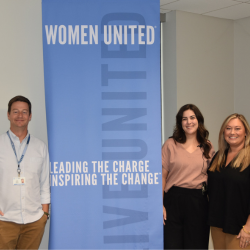
Women United, one of United Way of Central Alabama’s (UWCA’s) leadership societies, regularly hosts educational sessions so that members can find out more about key issues impacting our community. On September 14th, panelists gathered to discuss the continuing fallout from the Opioid Crisis, the prevalence of substance use disorder and the barriers to recovery.
Rachel Puckett, Director of the Healing Network, facilitated a discussion with the following panelists:
- John Bayles – Program Director, Recovery Resource Center, Crisis Center
- Elizabeth Norman – Associate Director, Fellowship House Recovery Services
- Darlene Traffanstedt – Medical Director, Jefferson County Department of Health
Puckett kicked off the discussion with an important note about language. Vocabulary is shifting, and with good reason. For example, the term “addict” versus “someone who struggles with substance use disorder” or “rehab” versus “treatment” creates an entirely different framework around the conversation. Using judgmental language can in and of itself be a barrier to recovery. Puckett said, “Shifting our language can reduce stigma and improve outcomes.”
John Bayles introduced himself as someone in long-term recovery to further illustrate the importance of this shift. “Changing our language forces people to acknowledge old ideas and recognize that this is an actual person they’re talking about,” Bayles said. “’Addict’ conjures the idea of someone disheveled or living under a bridge. When I was struggling, I looked exactly how I look now.”
From 2019 to 2022, overdose deaths in Jefferson County have jumped from 236 to 452. Dr. Traffanstedt addressed how the problem is worsening due to drug cartels lacing pills with Fentanyl because it’s quicker and more profitable to produce pills than to wait to plant, grow and harvest something like marijuana. Because of this, many people aren’t even aware that they’re consuming an opioid. “The Jefferson County Department of Health’s primary role is that of a gap-filler/facilitator. One gap we’ve filled was creating a website where people can request free Naloxone, an emergency treatment for opioid overdose, after access was restricted elsewhere,” said Dr. Traffanstedt. She recommended that parents talk to their children about the dangers of unknowingly consuming laced drugs and suggested families keep a Naloxone kit in their house.
Elizabeth Norman said, “It’s so important for someone to be able to access services when they’re ready.” This is why Fellowship House Recovery Services implemented pre-treatment classes as a way to help someone even if they were on the waitlist for residential services. This is crucial because, as Bayles pointed out earlier in the discussion, “Each day of waiting for access to treatment is a day someone could overdose.” Part of the importance of this discussion was breaking down stigma, therefore making resources and treatment more accessible.
The Crisis Center and Fellowship House Recovery Services are UWCA partner agencies, so when you support UWCA, you’re supporting access to services for people who are battling these diseases.
If you or a loved one is struggling with substance or alcohol use disorder, here are some resources and next steps you can take:
- Access free Fentanyl Test Strips & Naxolone by taking this free online training provided by the Jefferson County Health Department.
- Advocate for local spending of pharmaceutical payouts by contacting your local city councilors and state representatives to let them know it is important. Remember to ask how they plan to spend the funds. Click here to find your legislator.
- Do you or a loved one need help? Reach out to the Recovery Resource Center as your first point of contact. Additional resources are also available through Fellowship House.
- Continue to support this important work through an annual donation to United Way of Central Alabama.